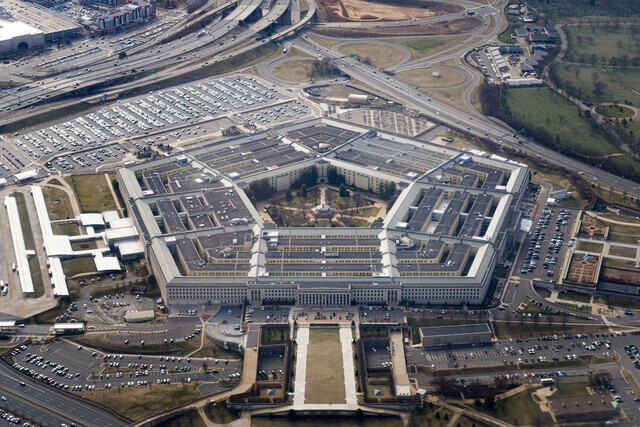hankyoreh
Links to other country sites 다른 나라 사이트 링크
[Editorial] Even after having its sovereignty violated, S. Korea’s presidential office is concerned with US' opinion of it

Evidence has emerged that US intelligence agencies have been spying on South Korea’s National Security Office.
That represents a serious breach at the very heart of Korea’s national security, which is embarrassing in and of itself.
But even more embarrassing is the response made by Korea’s presidential office. Days after the news broke, Korean officials hadn’t made a peep about asking the US to provide an explanation or prevent a recurrence.
President Yoon Suk-yeol seems intent on minimizing the fallout of the news out of concern for how it might impact his state visit to the US this month.
Some of the hundred or so Pentagon documents leaked on social media contain details about the NSO’s deliberations over whether to comply with Washington’s request to provide artillery shells to Ukraine. A conversation between NSO head Kim Sung-han and secretary for foreign affairs Lee Mun-hee (both of whom have since resigned) in early March has the vividness of an overheard conversation.
US media, including the New York Times and the Washington Post, have reported that the source of the information was SIGINT, standing for signals intelligence, or intelligence acquired through electronic equipment. That suggests that US intelligence agencies have been spying on the conversations of key national security officials in Korea.
Along with eroding trust in the Korea-US alliance, that may well be a violation of sovereignty.
Despite an international uproar over the US media reports since last weekend, Yoon’s office has been quick to downplay the issue as not presenting any harm for the Korea-US alliance and to focus on covering up for US misdeeds. The Korean government hasn’t taken the obvious step of asking the US to look into the incident and prevent a recurrence — in fact, Yoon’s office hasn’t issued any kind of official statement as of Monday.
After both the ruling and opposition parties criticized Yoon’s meek stance on the issue, an official from the presidential office suggested on Monday that the leaked documents had been manipulated and argued that the first priority was to verify whether they were actually authentic.
That official grudgingly conceded that “once both sides have gotten a handle on the situation, we plan to request appropriate measures from the US if necessary.” But the next remarks inexplicably put the blame on the Korean public: “If there are forces that exaggerate or misrepresent this incident with the hope of rattling the alliance shortly before the Korea-US summit, they will face stiff resistance from the public.”
Even granting that the US has a massive impact on Korea’s national security, such a stance is hard to understand.
When the widespread surveillance activity of the US’ National Security Agency was revealed in October 2013, the leaders of such countries as Germany, France and Brazil vocally objected to what they described as “unacceptable behavior,” forcing the US to make a public pledge not to spy on its allies. The lesson here is that even among allies, responding firmly to violations of sovereignty is necessary for maintaining trust and protecting the national interest.
The presidential office, fearful that the fallout from the latest discoveries will negatively impact Yoon’s state visit to the US, is undermining Korea’s own diplomatic principles.
Yoon’s habit of making excuses for the US is especially troublesome at a time when the US is prioritizing its own interests in major industries such as semiconductors and batteries and the North Korean nuclear weapon and missile issue is growing worse by the day.
Please direct questions or comments to [english@hani.co.kr]

Editorial・opinion
![[Editorial] Penalties for airing allegations against Korea’s first lady endanger free press [Editorial] Penalties for airing allegations against Korea’s first lady endanger free press](https://flexible.img.hani.co.kr/flexible/normal/500/300/imgdb/original/2024/0502/1817146398095106.jpg) [Editorial] Penalties for airing allegations against Korea’s first lady endanger free press
[Editorial] Penalties for airing allegations against Korea’s first lady endanger free press![[Editorial] Yoon must halt procurement of SM-3 interceptor missiles [Editorial] Yoon must halt procurement of SM-3 interceptor missiles](https://flexible.img.hani.co.kr/flexible/normal/500/300/imgdb/child/2024/0501/17145495551605_1717145495195344.jpg) [Editorial] Yoon must halt procurement of SM-3 interceptor missiles
[Editorial] Yoon must halt procurement of SM-3 interceptor missiles- [Guest essay] Maybe Korea’s rapid population decline is an opportunity, not a crisis
- [Column] Can Yoon steer diplomacy with Russia, China back on track?
- [Column] Season 2 of special prosecutor probe may be coming to Korea soon
- [Column] Park Geun-hye déjà vu in Yoon Suk-yeol
- [Editorial] New weight of N. Korea’s nuclear threats makes dialogue all the more urgent
- [Guest essay] The real reason Korea’s new right wants to dub Rhee a founding father
- [Column] ‘Choson’: Is it time we start referring to N. Korea in its own terms?
- [Editorial] Japan’s rewriting of history with Korea has gone too far
Most viewed articles
- 1[Editorial] Penalties for airing allegations against Korea’s first lady endanger free press
- 2Months and months of overdue wages are pushing migrant workers in Korea into debt
- 3In rejecting statute of limitations defense in massacre case, Korean court faces up to Vietnam War a
- 4Historic court ruling recognizes Korean state culpability for massacre in Vietnam
- 51 in 3 S. Korean security experts support nuclear armament, CSIS finds
- 6“Those souls can rest now”: Vietnam massacre survivor reacts to Korean court win
- 7[Reporter’s notebook] In Min’s world, she’s the artist — and NewJeans is her art
- 8[Editorial] Verdict on Korea’s massacre in Vietnam a first step in atonement
- 960% of young Koreans see no need to have kids after marriage
- 10[Editorial] Yoon must halt procurement of SM-3 interceptor missiles